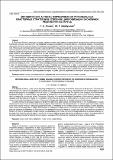| dc.contributor.author | Яшева, Галина Артемовна | |
| dc.contributor.author | Вайлунова, Юлия Геннадьевна | |
| dc.coverage.spatial | Брест | |
| dc.date.accessioned | 2023-04-17T08:13:19Z | |
| dc.date.available | 2023-04-17T08:13:19Z | |
| dc.date.issued | 2023 | |
| dc.identifier.citation | Яшева, Г. А. Методические аспекты формирования региональных кластерных стратегий в условиях цифровизации экономики Республики Беларусь / Г. А. Яшева, Ю. Г. Вайлунова // Вестник Брестского государственного технического университета. – 2023. – № 1 (130). – С. 153–158. | |
| dc.identifier.uri | https://rep.bstu.by/handle/data/33294 | |
| dc.description | G. A. Yasheva, Y. G. Vailunova. METHODOLOGICAL ASPECTS OF FORMING REGIONAL CLUSTER STRATEGIES IN THE CONDITIONS OF DIGITALIZATION OF THE ECONOMY OF THE REPUBLIC OF BELARUS | |
| dc.description.abstract | В Республике Беларусь кластерная политика становится важным инструментом стимулирования инновационного развития экономики. Кластерная концепция, принятая в 2014 году определяет методологию разработки кластерной политики в Республике Беларусь. Инструментами реализации кластерной политики являются государственные программы и стратегии, в которых запланировано создание структур кластерного типа. Региональная кластерная стратегия входит в состав стратегии инновационного развития. Важным фактором, повлиявшим на трансформацию кластерной концепции, является Четвертая промышленная революция (Индустрия 4.0), которая меняет экономику и общество. Целью статьи является разработка методических основ формирования региональных кластерных стратегий под влиянием Индустрии 4.0. Задачами исследования являются: идентификация предпосылок и условий трансформации кластерной концепции под влиянием Индустрии 4.0; разработка этапов и методов формирования региональных кластерных стратегий. В статье определены следующие предпосылки трансформации кластерной концепции: развитие ИКТ и цифровизация общества; развитие сетевых форм взаимоотношений между субъектами; «Демократизация» знаний благодаря Интернету; цифровая трансформация, вызванная четвёртой промышленной революцией. С учетом этих факторов разработана методика формирования региональных кластерных стратегий, которая включает следующие этапы. 1 этап: SWOT-анализ кластеризации в регионе (определены факторы и показатели); 2 этап : формулирование целей и задач по кластеризации в условиях цифровой экономики (построена архитектура целей и задач с учетом возможностей Индустрии 4.0); 3 этап : разработка кластерных стратегий (предложен многовариантный подход к оптимальному набору стратегических альтернатив в зависимости: от стадии жизненного цикла кластеров ; степени развития кластерных отношений; от целей и приоритетов в цифровизации); 4 этап: реализация кластерной стратегии включает финансирование кластерных программ, оценку их эффективности, мониторинг за ходом выполнения. | |
| dc.language.iso | ru | |
| dc.publisher | БрГТУ | |
| dc.subject | кластер | |
| dc.subject | кластерная политика | |
| dc.subject | цифровизация | |
| dc.subject | кластерная концепция | |
| dc.subject | кластерная стратегия | |
| dc.subject | cluster | |
| dc.subject | cluster policy | |
| dc.subject | digitalization | |
| dc.subject | cluster concept | |
| dc.subject | cluster strategy | |
| dc.title | Методические аспекты формирования региональных кластерных стратегий в условиях цифровизации экономики Республики Беларусь | |
| dc.type | Статья (Article) | |
| dc.identifier.udc | 338.24 | |
| dc.abstract.alternative | In the Republic of Belarus, cluster policy is becoming an important tool for stimulating the innovative development of the economy. The cluster concept adopted in 2014 defines the methodology for developing cluster policy in the Republic of Belarus. The instruments for the implementation of cluster policy are state programs and strategies in which the creation of cluster-type structures is planned. The regional cluster strategy is part of the innovation development strategy. An important factor that influenced the transformation of the cluster concept is the Fourth Industrial Revolution (Industry 4.0), which is changing the economy and society. The purpose of the article is to develop methodological foundations for the formation of regional cluster strategies under the influence of Industry 4.0. The objectives of the study are: to identify the prerequisites and conditions for the transformation of the cluster concept under the influence of Industry 4.0; development of stages and methods for the formation of regional cluster strategies. The article defines the following prerequisites for the transformation of the cluster concept: the development of ICT and the digitalization of society; development of network forms of relationships between subjects; «Democratization» of knowledge thanks to the Internet; digital transformation caused by the fourth industrial revolution. Taking into account these factors, a methodology for the formation of regional cluster strategies has been developed, which includes the following steps. 1. Stage: SWOT-analysis of clustering in the region (factors and indicators are determined); Stage 2: formulation of goals and objectives for clustering in the digital economy (the architecture of goals and objectives has been built, taking into account the capabilities of Industry 4.0); Stage 3: development of cluster strategies (a multivariate approach to the optimal set of strategic alternatives is proposed depending on: the stage of the cluster life cycle; the degree of development of cluster relations; the goals and priorities in digitalization); Stage 4: the implementation of the cluster strategy includes the financing of cluster programs, evaluation of their effectiveness, monitoring the progress of implementation. | |
| dc.identifier.doi | https://doi.org/10.36773/1818-1112-2023-130-1-153-158 | |
